Kristen Lamb's Blog, page 43
March 24, 2016
13 Ways Writers are Mistaken for Serial Killers

Image via Creepy Freaky House of Horror (Facebook)
I love being a writer. It’s a world like no other and it’s interesting how non-writers are simultaneously fascinated and terrified of us. While on the surface, people seem to think that what we do is easy, deep down? There is a part that knows they’re wrong. That being a writer, a good writer, is a very dark place most fear to tread.
In fact, I think somewhere at the BAU, there’s a caveat somewhere. If you think you profiled a serial killer, double check to make sure you didn’t just find an author.
Hint: Check for empty Starbuck’s cups.
Writers, if you are NOT on a government watch list? You’re doing it wrong.
Seriously. I took out my knee last week (ergo the sudden dropping off the face of the blogosphere) which just left me a lot of free time to drink and contemplate murder. I’m plotting a new book and kid you not…spent all of the weekend trying to figure out how to murder oil workers and make it look like an accident. Then yesterday, I spent like two hours on Google trying to find the right hotel balcony to toss someone off of.
Apparently “normal” people do not do this, which is why being normal is totally boring and for losers.
So before friends and family turn you into the FBI, here is a handy list of ways we writers are often mistaken for serial killers.
#1 Serial Killers Writers Need Alone Time
Generally, dealing with the public is only for a purpose (like making others think we are normal). To truly recharge and immerse in the art of what we do, we need to pull back and simply “get away.” Many writers can be found in basements, dark corners of libraries or lurking behind a desk surrounded with bear traps.
#2 Serial Killers Writers Often Hold Down a “Normal” Job
Many writers are also teachers, engineers (or likely married to an engineer—What is WITH that?), lawyers, doctors, or even librarians. We are friendly, polite and on-time and hold down gainful employment. This is what makes writers SO terrifying. You probably work with one.
You might even be married to one.
#3 Serial Killers Writers Can Look Just like YOU
When our book comes out, neighbors will say, “But she seemed so nice and normal. Really polite. Always thought something was off, but writing? Really? Who can ever know these things.”
#4 Serial Killers Writers Understand Law Enforcement
And probably dated it :D ….until they married an engineer.
When planning any murder or series of murders, we have to know our enemy. The cops. What are ways we can confuse them? Can we kill in multiple jurisdictions knowing the law agencies will never properly communicate and thus we can kill as many people as our plot requires? Can we run the police down a rabbit hole of distraction?
Can we evade them altogether? Get rid of ALL the evidence?

Image via Creepy Freaky House of horror (Facebook)
#5 Serial Killers Writers Use Terms Like T.O.D.
Throw T.O.D. around a writers group and no problemo. But using this term at Thanksgiving with the family? Meh. We writers know the best time of year to kill and dump the body and which season a shallow grave is an acceptable option. No writer ever sees just a freezer. Trust me, we are thinking how many people we can fit in that sucker and if we’ll have to saw apart the body first.
#6 Serial Killers Writers Hear Voices That Tell Them Who to Kill
And often talk to those voices. We might be driving to Costco when the Voice visits and tells us that we really shouldn’t kill that asshat who stood us up for prom. No, the slutty cheerleader he dumped us for is a way better choice. Then, so enraptured with talking to the Voice, we find we missed the last fifty exits and have to hope there’s a Costco in the neighboring state.
#7 Serial Killers Writers Choose Victims Carefully
Generally our victims will include anyone who picked on us in high school or ever broke up with us via Facebook or text message. Victims can also include anyone who ever worked in HR or customer service for AT&T.
#8 Serial Killers Writers Plan Their Kills Methodically
Sure you might get the fantasy or sci-fi author who just exterminates an entire race, but for the rest of us? No, we thought those kills out. We can’t just kill anyone lest we be left with a pacing and plot problem.
Duh.
#9 Serial Killers Writers Have a Timeline for Their Kills
Sure the body count will rise, but during revisions? We just go back and spend quality time with the souvenirs we took off our victims. We might even take breaks between books because we can’t murder characters without a plan. Helloooo?
#10 Serial Killers Writers are Narcissists
Seriously, we have to be. Who else can write hundreds of thousands of words just knowing the world will love every bit of what you put down? And PAY MONEY to consume it? Narcissists have a God-complex but unlike serial killers who pretend to be God?
We writers actually ARE.
#11 Serial Killers Writers Take People Apart
We crawl in your head, but don’t get too freaked out. We crawl in everyone’s head. We think like you. We become you.

Image via Creepy Freaky House of Horror (Facebook)
What???? Don’t judge me. You do this too! :P
Okay so when ACTORS do this it is OKAY but a writer does this and it’s creepy? We need to know how people think, what makes them tick, what sets them off. What are the right pain points and speaking of pain…
#12 Serial Killers Writers Are Also Sadists
Excellent fiction is the path of greatest resistance which means good writers are all about exacting pain. Doling it out bit by bit. Upping the heat and making that victim and all who love him squirm, then panic, then question the very meaning of their existence. We push our victims until just before that spark of hope in their eyes extinguishes completely.
And then we give them a bone and rescue them so there. We aren’t completely heartless. Sheesh, these people are imaginary. Why so freaked out?
#13 Serial Killers Writers Struggle with Addiction/Compulsion
Drugs and alcohol? Maybe. Books and cute bookmarks we never use because we lost them and so have to use the receipt from purchasing the freaking bookmark as a bookmark? Definitely. Female serial killers writers can often be spotted wandering around a craft store talking to the yarn. Males? Computer stores.
Angels and Devils
Yeah yeah writers could be mistaken for serial killers but in the end, everything we do is for the ultimate good. We actually have to write in mistakes lest our villain remain free and that is bad fiction.
Speaking of which, have you ever created a villain so good you had to go BACK and write in some oopses? Like, “Wow, this guy’s good. Nope, they’d never catch him. Ah sh#!.”
Okay so some of you by now are either laughing and nodding…or you’re dialing an FBI hotline ready to link them to my blog. Fine, when they haul me away in cuffs, trust me I am taking notes so when I write a similar scene? I know how cuffs FEEL.
So there :P .
What are your thoughts? Have you ever had strangers overhear you talking about how to kill someone and you had to stop and say, “It’s okay. I’m a writer.” Do you love Discovery ID just a bit more than is probably healthy? Do you freak out friends and family because autopsies make you giddy?
I LOVE hearing from you!
To prove it and show my love, for the month of MARCH, everyone who leaves a comment I will put your name in a hat. If you comment and link back to my blog on your blog, you get your name in the hat twice. What do you win? The unvarnished truth from yours truly. I will pick a winner once a month and it will be a critique of the first 20 pages of your novel.
Before we go, I want to give you a heads up especially if you are thinking on attending a conference.
I’m holding my ever-popular Your Story in a Sentence class. Can you tell what your book is about in ONE sentence? If you can’t? There might be a huge plot problem. This also helps if you are ever going to query or pitch an agent. The first ten signups get their log-line shredded by MOI for FREE.
For those who need help building a platform and keeping it SIMPLE, pick up a copy of my latest social media/branding book Rise of the Machines—Human Authors in a Digital World on AMAZON, iBooks, or Nook.


March 16, 2016
Want a Page-Turner? You Need Deep POV
 Today, I’m busy finishing up work before I have to travel and speak in Utah, so since we’d been discussing Deep POV, I figured I’d get a Deep POV expert to come and weigh in on the subject. Marcy Kennedy is an excellent teacher and has actually written a whole book on the subject, and she’s taken time out of her busy schedule to help us out.
Today, I’m busy finishing up work before I have to travel and speak in Utah, so since we’d been discussing Deep POV, I figured I’d get a Deep POV expert to come and weigh in on the subject. Marcy Kennedy is an excellent teacher and has actually written a whole book on the subject, and she’s taken time out of her busy schedule to help us out.
Take it away, Marcy!
***
In her post Introducing Deep POV—WHAT IS It? Can We Buy Some on Amazon? Kristen explained why deep POV is more popular than the old trends that defined the classics. Those old ways of writing? Probably not coming back unless an EMP pulse permanently fries all our technology.
I think it’s actually a great thing we’ve moved on to deep POV. Deep POV is the magic sauce that can make our books so all-consuming that readers miss their subway stops, consider calling in sick for work, and burn the casserole.
Why? Well, in deep POV, there’s no distance between the reader and the character. The reader experiences the world through the character’s mind, body, and senses. They hear the character’s voice. It’s personal and intimate. This means readers form a stronger connection to the characters and they have to know what happens to them.
It also means that everything is filtered through the character before readers receive it. Nothing is objective. The character is interpreting the story for us in the same way that we interpret what happens in our lives. That means that in deep POV even the “less exciting” parts like description become exciting because they show emotion and personality.
So let’s look at two ways we can develop deep POV in our writing…
Show the Emotion, Don’t Tell It
This works to suck the reader in because we’re feeling an emotion rather than being told about an emotion. If I tell you that I’m sad, or feeling guilty, or scared, you’re not going to feel much. There’s too much distance. It’s too cold and flat.
If you’re brought in so close that my sadness or guilt or fear becomes real to you, maybe even reminds you of when you felt those emotions, now you’re feeling it too.
Let’s take an example.
Telling: Jennifer was sad because of the death of her daughter. She went into the little girl’s room and threw one of her favorite toys against the wall, shattering it.
Even an empath wouldn’t feel anything from the shallow Telling version.
Deep POV (Showing): Jennifer stood face to face with the delicate porcelain doll Ellie idolized too much to even play with. The doll stared back, her face held in an immortal smile, mocking. No doll deserved to live longer than the little girl who owned her. Jennifer snatched the doll from the shelf and heaved her toward the far wall. The doll’s head exploded like a car bomb, fragments flying everywhere.
In the Deep POV version, this is now a specific, nuanced sadness. It’s how Jennifer experiences her sadness. Jennifer isn’t just sad. She’s also angry, maybe even a little bitter. That’s very different from a character who is sad and guilty, or a character who is sad…but also a little bit relieved.
Use Description as a Way to Increase Tension, Heighten Emotion, and Reveal Personality
How many times have you skimmed over a description that read something like this?
Jennifer ducked into the only other room in the apartment—a bedroom. It had a Captain’s bed, an end table butted up to the bedside, and big windows along one wall. Ugly orange and green curtains covered the windows from the top to three inches off the floor. To one side was a tiny, doorless bathroom. She had nowhere to hide, and if he found her here, he’d kill her.
Yawn. I almost fell asleep writing it. I’ve described the room, but it’s a boring description because these are the objective facts. There aren’t any opinions to go along with it. There’s no personality.
Let’s try this again in deep POV. This time I’m going to weave the description in among the action (when Jennifer would naturally pay attention to each item) and let Jennifer tell it in her voice.
Jennifer careened into the only other room in the apartment—a bedroom. The unmade bed was one of those Captain styles with drawers underneath that she’d always associated with kids, not adults. No place to hide there.
Out in the main room, the rattle of a chain marked him locking the door behind him.
She spun in a circle. The only door other than the one she came in led to a tiny bathroom. Without a door. What kind of a person didn’t at least hang up a curtain? She glanced inside. Or a shower curtain for crying out loud.
A clatter on the kitchen countertop. Probably keys and a cell phone being emptied from a pocket. If he was like most people, his next stop would be the bathroom. And he’d catch her. And she’d be dead.
She skittered back to the orange-and-green pinstriped curtains that looked like rejects from the second-hand store her Aunt Bertie owned in the 80s. She ducked behind. Her feet stuck out the bottom. If he didn’t look down…please God let him not look down.
We now have a description of the bedroom that not only shows us the facts but also adds to the tension and hints at the personalities of both Jennifer and the man who owns this bedroom.
That’s the way deep POV makes description—and everything else—interesting.
***Thank you, Marcy. And, as a correction…
I was wrong, you CAN buy Deep POV on Amazon…well at least a good book about it.
Please check out Marcy’s book Deep Point of View on Amazon (and on Barnes and Noble, Apple iBooks, and Kobo too). It’s available in print and ebook, and it’ll help you learn how to rock deep POV!


March 13, 2016
Getting in Character—Deep POV Part Two

Image courtesy of Jules Morgan via Flickr Creative Commons
Yes today is odd. Posting on a Sunday. We are headed into Spring Break and yeah…hard to maintain my usual schedule. Today we’re going to dive deeper into deep POV and then, later in the week, I am going to bring you guys an expert on deep POV ;) .
Will be fun.
To accomplish “deep POV” yes, there are style changes we can make, like removing as many tags as we can and ditching extraneous sensing and thinking words. But deep POV is more than just tight writing, it’s also strongly tethered to characterization. Good characterization.
It is essential to know our cast if we hope to successfully write “deep POV.”
KNOW Your Cast
There are all kinds of ways to get to know our characters. I often write detailed character backgrounds before starting a story so it doesn’t become a fish head.
Why we need to know our characters is that deep POV is a reflection of the inner self, how that character sees the world, responds, evades, processes, etc. It is also a reflection of personal history and relationship dynamics.
*cue brain cramp* *hands paper bag*
It’s okay. Breathe. We’re going to unpack this.
Reflection of the Character

Image via Flickr Creative Commons. Bansky’s “Peaceful hearts Doctor” courtesy of Eva Blue.
Back when I used to run a weekly workshop, I had writers do a little exercise to help them learn POV and also strengthen character-building skills. I gave this scenario:
We have a family of four—Mom, Dad, a grandparent (either gender) and a teen (either gender) who has spent a year saving for a family vacation. On the way to their destination, the vehicle breaks down. What happens and tell it from the perspective of EACH family member.
Every week, writers showed with the perspective of one of the four. We had ASTONISHING creativity.
Who These Characters ARE Changes the Story AND Deep POV
When we layer in some background, the characters (and consequently the story, problems and conflict) all change drastically.
What if dad is finally home from his forth tour in Afghanistan and has terrible PTSD?
What if Mom is a closet alcoholic?
What if the teen is recently in remission from Leukemia?
What if Grandma is a tireless flirt who’s antics got her turned into a vampire and the family can’t understand why Granny wants to travel only at night?
What if the teen is an asthmatic and forgot his inhaler?
What if Granddad has early on-set Alzheimer’s?
What if the teen has been recruited for a mandatory deep space mission by the New Earth government and will never see the family again?
What if the teen was adopted and the purpose for the trip was to meet the child’s birth mother? How would this impact the emotions of those in the vehicle?
What if there used to be TWO children and one had died in an accident a year previously?
Do you see how by changing WHO these people are, this cannot HELP but affect everything else?
If Dad has PTSD, he might jump at every lump of roadkill because that’s how insurgents hide IEDs. If the family is stranded and Mom can’t get to a liquor stash, she might start getting belligerent or, left too long, start going through DTs. What would an addict notice? Likely nothing beyond how to get a fix.
While a kid in remission with a new lease on life might enjoy being broken down in the middle of nowhere (appreciating the little things in life) the addict would be hysterical.
All of this will impact Deep POV because we are in the HEAD and EMOTIONS of the character.
Let’s pick on Mom for an illustration. I’m riffing this, so the writing is just an illustration. Just roll with it.
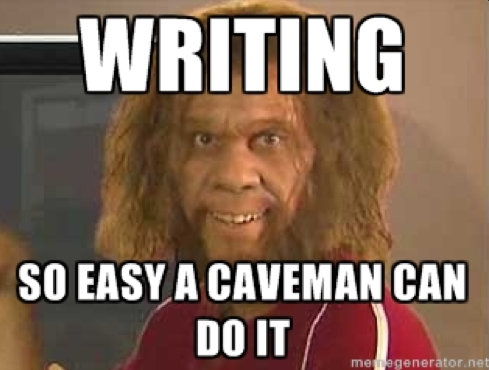
Geiko Caveman.
Kidding! Lighten up. You seem tense.
Example One:
Fifi clutched the baby picture, the one she’d carried everywhere for fifteen years. She hated she was happy the old van had finally given out. Her husband stared, bewildered at the smoking engine. Other than car trouble, he seemed fine. Fine. How can he be fine?
She glanced back at her daughter, the living reflection her of all her dreams and failures. She’d wanted a baby more than life. Every night on a freezing floor. One miscarriage after another and then came a tiny bundle of everything she’d ever longed for.
That woman hadn’t wanted her. That woman had abandoned her. That woman was Gretchen’s real mother and now Gretchen wanted to meet her. Real mother, like hell. And I’m a real astronaut.
How had she failed? If she’d been a good mother, Gretchen would have forgotten that woman and they wouldn’t be here.
“You okay?” Her daughter bent between the seats and kissed her cheek. “You said this was okay, that we could do this. You’re sure, right?” A wary smile revealed new braces, the braces Fifi paid for with money she’d saved for a new van.
“I’m fine, Honey.” She crumpled the baby picture and opened the van door. She needed air.
***
Example Two:
Fifi clutched the baby picture, the one her daughter had given her a week ago for Mother’s Day when they picked her up from rehab. Ninety days clean. At least that was the lie she’d packed along with her swimsuit and the hairspray can with the secret compartment and the only pills they hadn’t found.
The pills that were now gone.
They should have already been at the resort, the one staffed with eager friends willing to help her out. Friends with first names only who took cash and asked no questions.
Fifi scratched at her arms. Millions of insects boiled beneath her skin, invaded her nerve endings and chewed them to bleeding bits. Pain like lightning struck her spine, the section crushed then reconstructed. Pain like lightning spidered her brain, frying her thoughts. She glanced again at the baby picture, then at the fine young woman in back. Her daughter Gretchen.
What am I doing?
Maybe she would be okay. Maybe she hadn’t had enough pills to completely undo her. Maybe she could ride this out. And maybe I’m the Queen of England.
Gretchen bent between the seats and kissed her on the cheek. “I love you, Mom. You okay?”
Tears clotted her throat. She nodded. “Yes, I’m fine, Honey.”
“You mean it?”
She hesitated then smiled. “Yes. Yes I do.”
She tucked the baby picture in her shirt pocket, close to her heart and opened the van door. She needed air. She also needed to change their plans. Visit somewhere with no friends. With no one who took cash.
Do you see how changing WHO Fifi is changes everything? Everything she is sensing, feeling, thinking. Being in the emotions of a heartbroken mother who feels betrayed is a very different experience from being in the head of a sympathetic addict who’s struggling to get clean and stay clean.
***
Both women are impacted by the daughter. One Fifi is hurt by the daughter, the other Fifi finds hope in the daughter. Both women are conflicted. One is tormented with feelings of failure and betrayal and the other is tormented by failure, but very real physical problems of addiction that impact the story.
Deep POV has thrust us into the head and emotions of both women. We feel what they feel. The author is invisible because there are no tags. The sensations are raw and visceral because we have gotten rid of the coaching words.
Instead of:
Fifi felt millions of insects boiling beneath her skin….
We get right to it.
Millions of insects boiled beneath her skin…
The sensation is CLOSER. There is no psychic distance. She isn’t thinking she is going to lose it. She isn’t wondering if she can keep it together. She is experiencing everything real-time and up-close.
Instead of:
Fifi thought, What am I doing?
She just does. We KNOW Fifi is thinking because we are camped in her head.
Deep POV is Akin To Method Acting
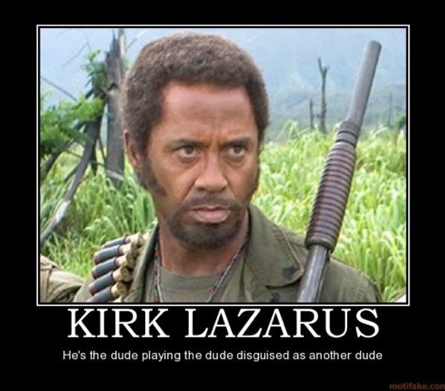
Couldn’t resist. I LOVE “Tropic Thunder”!
When we know our characters, who they are, how they came to be, the formative experiences, what they want from life, etc. we can then crawl in that skin and become that person. By us becoming that character, we then have the power to transport our reader into the skins we have fashioned.
I hope this helps you guys understand the magical, mystical deep POV and now you’re all excited about writing stronger characters. What are your thoughts?
Before we go, I want to give you a heads up especially if you are thinking on attending a conference.
I’m holding my ever-popular Your Story in a Sentence class. Can you tell what your book is about in ONE sentence? If you can’t? There might be a huge plot problem. This also helps if you are ever going to query or pitch an agent. The first ten signups get their log-line shredded by MOI for FREE.
Also speaking of FREE, I’d like to mention again the new class I am offering!
How and WHY are we using FREE!?
Making Money with FREE! As a bonus for this class, my friend Jack Patterson who’s so far sold over 150,000 books to come and teach us how to ROCK the newsletter. This is in excess of two hours of training and the recording (as always) comes with purchase.
I LOVE hearing from you!
To prove it and show my love, for the month of MARCH, everyone who leaves a comment I will put your name in a hat. If you comment and link back to my blog on your blog, you get your name in the hat twice. What do you win? The unvarnished truth from yours truly. I will pick a winner once a month and it will be a critique of the first 20 pages of your novel.
For those who need help building a platform and keeping it SIMPLE, pick up a copy of my latest social media/branding book Rise of the Machines—Human Authors in a Digital World on AMAZON, iBooks, or Nook.


March 9, 2016
Introducing Deep POV—WTH IS It? Can We Buy Some on Amazon?
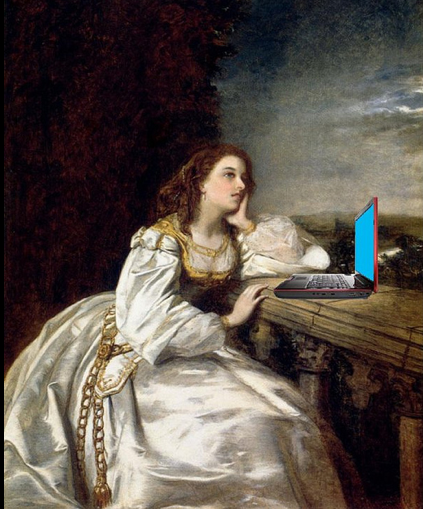
Image via Flickr Creative Commons, courtesy of Mike Licht
If you are a writer who has a goal of selling books it is wise to remember that audiences are not static. They change. Their tastes change with the times and we need to understand what is “trending” if we want to connect and entertain. Many new writers look to the classics for inspiration and there isn’t anything per se wrong with that, but we must reinvent the classics, not regurgitate them.
Even if you look at the fashion trends, sure some styles “come back around” but they are not exact replicas of the past. They are a modernized version. But keep in mind that some fashion styles never come back. They’ve outlived their usefulness and belong in the past. Same with fiction.
Story trends and fashions change along with the audience. For instance, Moby Dick spends an excruciatingly long time talking about whales, namely because the audience of the time probably had never seen one and never would. If we did this today? Sure, feel free to walk around in a literary gold-plated cod piece, but er…
Yes, awkward.
Epics were also very popular. Follow a character from the womb until death. FANTASTIC STUFF! Why? Because no one had HBO, Pinterest or Angry Birds. Books were a rare indulgence usually reserved for a handful of literate folks with the money or connections to get their hands on…a book.
Also, since writers were paid by the word, their works were padded more than a freshman term paper. Their motto? No modifier left behind. These days? We have to write leaner, meaner, faster and cleaner.
We’ve talked about POV before, and which one might be the best for your story. I can’t choose for any of you, but before we talk about deep POV, I want to mention that POV is also affected by audience and I believe is a direct reflection of how connected we are as a society.
You guys may or may not know that POV has changed along with communication and connectedness. Waaaaay back in the day, omniscient with a god-like narrator was all the rage. But people didn’t travel at all. Most humans lived and died in the place they were born and in isolation from other communities.
With the early epics, we often had a narrator who was separate from the events.
Dear Reader, come with me for a tale of AWESOME…
Later, after the Dark Ages, people got out more, traveled more, etc. We see the narrator merging into just general god-like presence. Then, after the printing press was invented, more and more people were reading and a lot of monks were out of a job and went off to start the first microbreweries.
Don’t argue. It’s history :P .

Image via kcxd courtesy of Flickr Creative Commons.
With pamphlets and papers, people became more engaged and journalism eventually gives birth to this new-fangled invention…first-person. Third person and third-person shifting only became popular after audiences grew accustomed to radio programs (and later television) and could mentally process the idea of a cut-to scene.
As people became networked closer and closer, we see the psychic distance closing. Now that we are a culture of reality TV and social media? Omniscient is a tough sell. I am not telling any of you what POV to choose, but I will say that modern readers will shy away from these older forms of POV because they “feel cold.” Modern readers LOVE being as close as possible, ergo my little side-trip through history.
And this is where we get *drum roll* deep POV.
You hear this word flung around the writing world. Oooh, deep POV. That is deep POV. Deep, Man.
Um, what is deep POV?
And, if you are like me, you go along and are too embarrassed to ask what the heck deep POV is? Everyone wants it. Readers love it. Uh, but what IS it? How do I do it? Can I order some off Amazon?
Deep POV is simply a technique that strips the author voice completely out of the prose. There is no author intrusion so we are left only with the characters. The reader is nice and snuggly in the “head” of the character.
Okay, clear as mud. Right? Right.
As an editor, I see the intrusion much more than authors. It is actually shocking how much you guys interrupt. In fact, you are like my mother chaperoning my first date who would swear she was quiet as a mouse.
NOT.
I actually like deep POV because I love tight prose. I loathe unnecessary words. Deep POV not only leans up the writing, it digs deeper into the mental state of the character. We probably aren’t going to stay completely in deep POV, but it’s a nice place to call “home.”
How do we do it? Today, for the sake of brevity, we are just going to talk about simple stylistic changes, not the actual writing. We will do that next time ;) .
First, Ditch the Tags
Just using the word “said” tells the reader we (the author) are there.
Kristen’s Made-Up Example (don’t judge me, just roll with it)
“No, I always love it when you drop by,” she said. Fifi felt her hands start to shake. She glanced over Tom’s shoulder and saw that the street was deserted. She knew all of her neighbors had already gone out of town for Christmas and no one would hear her scream. She thought, He is going to kill me.
Okay, so we get that Fifi is in a bad spot. But just that little word said tells us the author is present. So in the next layer we are going to remove the said.
While We Are Here? Thought and Sense Words—Ditch Those, Too
If we really pause and think about it, thought and sense words are frequently redundant. If we are IN the character’s head? We KNOW she is thinking. Who else would be thinking?
We aren’t dumb. Yes, it is my personal opinion, but I feel sensing and thinking words often qualify as holding the reader’s brain. We don’t need to. Readers are pretty smart.
Let’s look at my made-up example.
“No, I always love it when you drop by.” Fifi felt her hands start to shake. She glanced over Tom’s shoulder and saw that the street was deserted. She knew all of her neighbors had already gone out of town for Christmas and no one would hear her scream. She thought, He is going to kill me.
So we ditched the said and that tightened it up. Did you notice how losing the tag tightened the psychic distance? Now let’s remove these stubborn stains unnecessary sensing and thinking words.
***Also, try to ditch any “starting to”. Do or do not, there is no try starting to.
“No, I always love it when you drop by.” Fifi’s hands shook. She glanced over Tom’s shoulder. The street was deserted. All of her neighbors had already gone out of town for Christmas and no one would hear her scream. He is going to kill me.
Do you see how just getting rid of those excess words upped the tension of this piece? We (the reader) go from being a distant observer to being in the potentially deadly situation. We don’t need to tell the reader Fifi is thinking or feeling or about to do something. The reader gets that and us putting in glowing directional arrows is a distraction.
Fifi felt Tom’s hands clamp around her throat.
Just get to it already!
Tom’s hands clamped around her throat.
So I hope this helps clear up some of your “deep POV” questions. Remember that we live in a culture that is spoiled with intimacy and we can give them what they love. Next time, we will discuss characterization and how to write in deep POV beyond the stylistic choices.
Before we go, I want to give you a heads up especially if you are thinking on attending a conference.
I’m holding my ever-popular Your Story in a Sentence class. Can you tell what your book is about in ONE sentence? If you can’t? There might be a huge plot problem. This also helps if you are ever going to query or pitch an agent. The first ten signups get their log-line shredded by MOI for FREE.
Also speaking of FREE, I’d like to mention again the new class I am offering!
How and WHY are we using FREE!?
Making Money with FREE! As a bonus for this class, my friend Jack Patterson who’s so far sold over 150,000 books to come and teach us how to ROCK the newsletter. This is in excess of two hours of training and the recording (as always) comes with purchase.
Were you confused what deep POV was and why people all wanted one? Is it really much easier than you imagined? Do you silently wish the bustle would come back into style?
I LOVE hearing from you!
To prove it and show my love, for the month of MARCH, everyone who leaves a comment I will put your name in a hat. If you comment and link back to my blog on your blog, you get your name in the hat twice. What do you win? The unvarnished truth from yours truly. I will pick a winner once a month and it will be a critique of the first 20 pages of your novel.
For those who need help building a platform and keeping it SIMPLE, pick up a copy of my latest social media/branding book Rise of the Machines—Human Authors in a Digital World on AMAZON, iBooks, or Nook.


March 7, 2016
Going Pro—Learning from a Master & Win a Chance to Be James Patterson’s Next Co-Author

Could THIS be your new writing partner?
Today I have something exciting to tell you guys about *bounces up and down like a kid*. Last week we talked about Going Pro and today I’d like to springboard off some of what we talked about. One of the reasons it is so vital for authors to take ourselves seriously, is it directly impacts how we operate. So long as we view what we do as “our little thing” or “a hobby” or we are “aspiring,” we are hesitant to do the activities that will truly matter. We will fail to commit.
We are just “shacking up” with our dream instead of putting a ring on it.
If we haven’t yet mentally “gone pro” often we won’t make our writing a priority. Everyone and everything comes first and if there is any time left over? Well, then we can write.
No.
We will also fail to invest in getting better. We might buy reference books and writing guides, but we are still relying on being self-taught. Nothing wrong with starting this way, but for most of us? It will make the journey harder and longer and we will make many more mistakes that will take even MORE time to fix.
There are SO many times I wish an author would have hired me to consult on a plot before writing a 100,000 word mess that can’t be repaired. Or hired me to help create a brand before they spent three years creating something that is a train wreck.
Many new writers fail to appreciate that one conference, one class or a couple of hours of training could be the very difference in failure and success. I know I practically had to donate plasma to afford my first conference, but I met and befriended New York Times Best-Selling Author Bob Mayer and that one meeting changed my life…literally.
Had I not gone to that conference and connected with that expert? I would probably be in rehab working in sales and this blog would not exist. W.A.N.A. would not exist and tens of thousands of writers who have benefited from my books and classes?
Well, who knows?
All I know is had I not met Bob, the world would never have seen my author picture on a panty liner. Okay, well Bob would probably prefer I not mention that…
Don’t Advertise, PADvertise! Get in your reader’s wallet AND her pants!

Bob actually changed my life in a number of ways. One major lesson he taught me was the value in seeking help from professionals. Many of us are trying to blaze our way to success on our own, but we really don’t have to go it all alone. He taught me to look for people who have already done what I want to do and learn from them. They already have a map, why not use it? He was a major inspiration in me creating W.A.N.A.
In writing, I hire pros all the time. I am not happy being good at what I do. I am committed to being the best.
Currently, I am taking James Patterson’s Masters Class. Since I blog about writing and teach writing and yes, I write mysteries and thrillers? Why not look to someone who has mastered what I want to do? James is a master at outlining, writing quickly, and also he is GREAT at plot twists.
So imagine my surprise when Patterson’s Master’s Class people contacted me and told me they loved my blog and asked me to share some information with you guys.
A quick caveat.
Anyone who’s followed my blog more than a minute knows I am not for sale. I will only ever promote what I love and believe in. If I think something is snake oil? Not enough money in the world for me to tie my name to it.
Truthfully, I probably would have promoted this class on my blog anyway but was wanting to finish the whole thing before putting up my thoughts.
But there is a contest and the deadline is March 22nd, so I am blogging early about it. Was also hesitant to mention the contest on my blog, because, HELLO??? I am entering and why do I want to tell you guys? :P
And that is bad and selfish and I since really do love y’all so it would be fantastic to connect one of you in just the right way at the right time to make you a legend.
Just please remember me when you are famous.
Anyway, like me, James Patterson also has a passion for helping writers get that big break. He’d been teaching the class for a while and was so impressed with the quality of student work, that he wanted to use the class to recruit a new co-author. Then everyone wins.
Patterson fans are almost cult-like in their passion and devotion and they want a lot of stories. James is good, but hey, after 70 mega-best-selling books or so, maybe fresh blood is a good thing. This helps James keep his stories new and exciting and also uses his brand and platform to launch an unknown into the next big deal.
Personally, I just know he is going to love my idea about a dirty mall cop dealing weaponized poodles. Can Fifi, the assistant manager of the Smoothie King stop him from unleashing his poodle stockpile before Black Friday is the blackest ever?
Unleash? Get it? I already have merchandising ideas.

NO ONE suspects him….
Kristen FOCUS.
Those who are taking the Master’s Class can enter. And seriously, the class is $9o for 22 lessons and over three HOURS of instruction. Plus there are all kinds of hands-on assignments. You can upload samples for critique, often by James himself. I have been really impressed with the class and have learned a handful of small things that I was all *face palm* Why didn’t I think of that?
I listen to lessons often when I am doing chores.
The contest being added to this is icing on the cake. Take the class and do the assignments you would do anyway but then enter your work by March 22nd and maybe win some cash or…OMG! Co-author a book with James FREAKING Patterson. Most contests have an entry fee and they sure don’t come with 22 lessons and three HOURS of instruction from the world’s top-selling author.

Anyway, there you have it. Since the deadline is SO close, it will be a lot of work to do this, but that’s part of going pro. Learning that sometimes opportunity requires us to hustle.
I wish everyone sudden writer’s block the best of luck!
Even if this class is not your thing, please take to heart what I said. Conferences, classes and consulting can be complete game-changers. Invest in yourself. Invest in your future and your dream?
Put a ring on it ;) .
What are your thoughts? No Patterson bashing. I get he is not everyone’s cup of tea, but not all of us are aspiring to write for a Pulitzer. Are you guilty of not committing to your dream, just kinda dating it? Are you bad about putting money into becoming better? Maybe you feel silly or selfish? Have you put money into a class or a conference and it very literally changed EVERYTHING?
I would love to hear your stories!
To prove it and show my love, for the month of MARCH, everyone who leaves a comment I will put your name in a hat. If you comment and link back to my blog on your blog, you get your name in the hat twice. What do you win? The unvarnished truth from yours truly. I will pick a winner once a month and it will be a critique of the first 20 pages of your novel.
For those who need help building a platform and keeping it SIMPLE, pick up a copy of my latest social media/branding book Rise of the Machines—Human Authors in a Digital World on AMAZON, iBooks, or Nook.
Also if Patterson’s classes are not a good fit? Check out my THREE NEW CLASSES :D
Branding for Authors Learn how to create your own unique brand, a brand powerful enough to drive BOOK SALES.
Your Story in a Sentence–Crafting Your Log-Line Can you tell us what your story is about in ONE sentence? Anyone who is pitching an agent NEEDS THIS CLASS. First ten sign-ups get me shredding and fixing their log-line for FREE.
Speaking of FREE…
Making Money with FREE! This class is going to teach you when, where, how to use FREE as a larger strategy to MAKE MONEY. We should never give our work away unless it serves a greater professional goal.


March 2, 2016
Sending in the Flying Monkeys—Get Your @$$ to Work!

Via meme on Pinterest
So many people say the same thing. “If I could only find the time…” Thing is, time isn’t down in the couch cushions hanging out with loose change, the TV remotes and stale Cherrios. Time isn’t hiding. Time is everywhere.
And THAT folks is the problem.
Time is everywhere and all around and so we tend to waste it. People who are successful have the same amount of time. Difference is? They use it better.
Monday, I gave Ten Ways to Go Pro and I happened to mention the writing sprints we do on W.A.N.A.Tribe (a Ning I created for writers). But, because I didn’t want to derail the point of Monday’s post, I didn’t exactly explain what precisely we DO on W.A.N.A.Tribe.
I created W.A.N.A.Tribe so that writers all over the world could connect and share and network. There are all kinds of tribes to join or even start. Even if a tribe hasn’t been particularly active, hop in and type something and it springs to life like a jar of sea monkeys :D .
Have questions about self-publishing? There is a tribe for that. Need feedback on romance? There is a tribe for that.
But the real strength of W.A.N.A.Tribe has been in our daily ritual of meeting and working together in the Main Room IM field at W.A.N.ATribe. They began as sprints for NaNoWriMo. In the beginning, the sprints were sheerly for word count and they were 30 minutes long. But, that was during NaNoWriMo and word count is the ONLY thing that matters in November.
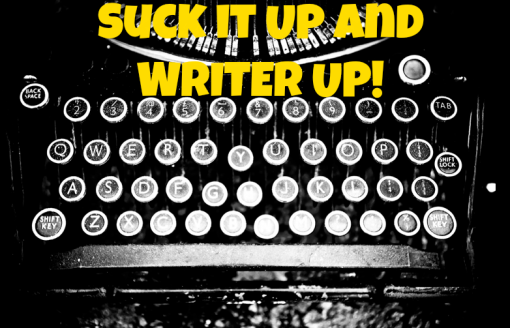
Thanksgiving? You mean Day They Announce the NaNo Winners Day?
But the hard truth all writers face is that word count and “writing” is only a small part of what we do. At W.A.N.A.Tribe, the sprinters and I realized that about a week into December…namely because we all had 50K or more that was probably a mess.
Welcome to The Blackout
So I created what we call BLACKOUTS. Tequila is optional.
We meet in the morning and chat for a couple minutes and then I set a timer for 40 minutes and we all go dark until I call TIME.
Then we have to report back what we accomplished. This can be word count, pages edited, or pages of research read. Report back that you almost finished a marketing plan, you emptied your e-mail and answered all business e-mail.
But the Blackout is still very different. Writers are people and we are people who do not own a cloning machine…
…but our laundry and dishes do.
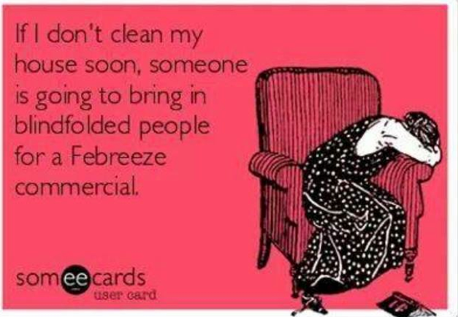
We use Blackouts for those things too.
I know I generally start writing at 4:30 a.m. I’m an early bird. Always have been. How my parents didn’t murder me as a child is still a mystery. I remember my mother forbidding me to get out of bed until the birds were awake. The second I heard one chirp! I was up and laying waste to the Cheerios waiting for the colored bars on the T.V. to change to Captain Kangaroo.
Yes, I am that old.
Anyway…
I do check in when I’m at my desk, so any super early birds? If y’all need to do a Blackout that does not involve losing consciousness back in your warm bed? I am there to help. This is to help those writers I KNOW cannot yet leave the day job, but who need that extra push in the morning.
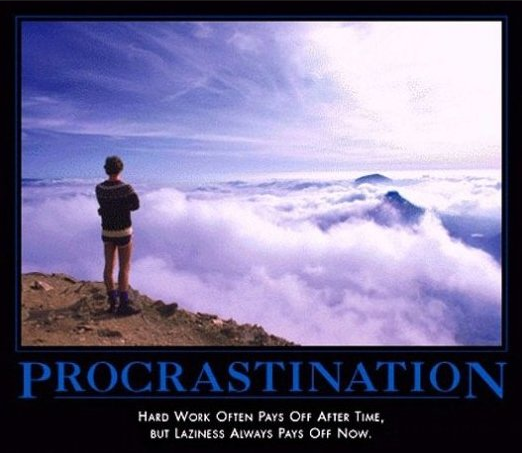
Since many times I have already been writing 2-3 hours by the time the Blackouts “officially” start (9:00 AM CST)? I usually use them for other things, including housework.
As I also mentioned last post, I consume an insane amount of audiobooks, but I do this while I do chores. While my body is getting out of the chair to move around? My brain gets a break from creating and switch to absorbing/refilling. Right now I am on my third book of the week—The Everything Store and The Age of Amazon.
Last week it was The 10X Rule (for the third time) and If You’re Not First, You’re Last and then finally, How to Win at the Sport of Business by Mark Cuban.
I did 75 loads of laundry while learning…a lot. There are all kinds of things I dread doing, but add in peer pressure?
Anyway, when I do a Blackout, my report back may look something like this:
Sorted all the laundry, got the washer and dryer going, folded two loads, listened to three chapters of a book while I did the dishes and then finally I emptied my e-mail.
I get WAY more accomplished when I have to focus. No more goofing off on Facebook, farting around on Twitter, or losing sense of time and place talking on the phone to my mom. I KNOW I am going to have at least ONE person I am going to have to face and if I just jacked around? Yeah…
Additionally I’ve noticed this type of activity attracts and keeps the hard-chargers. You want to be around authors who will push you to a higher level? Be around Maria Grace when she reports that over the Blackout, she wrote 1,400 words, started a newsletter, edited three chapters and cured cancer.
Trust me, your bar goes WAY higher.
Love you Spooky!
***We nicknamed her that because she gets so much done, well…it’s spooky.
Thus, in a Blackout, we get the energy and fun competition of a workplace environment, and there is the promise of a tad bit of chit-chat in between…by folks who WILL send in the flying monkeys if you don’t work your @$$ off.
A huge part of being successful as a writer is the ability to be self-disciplined and self-directed. Sure, I do fairly well at that on my own, but have been known to…SQUIRREL!

Wanna ride bikes? Play Barbies? I have a cat.
Where was I?
Oh, yes. Blackouts have really helped me maintain balance, focus and generate crazy productivity. Most of us actually can get far more accomplished than we realize, we just need to hustle. I have used Blackouts to do writing and then switched and used them for spring cleaning. I’ve even used them for a power nap. If I say I am going to rest for the next 40, I better do it (not clean up Hot Wheels in the living room).
If you join our group? Trust me. People are going to start asking questions if we don’t show. Meaning my attendance is usually pretty good unless I have appointments that have taken me out of my office.
I generally don’t do Blackouts in the evenings because I have jujitsu….or have blacked out literally from working all day. But any of you crazy cats who wanna give it a spin? We welcome you to join us!
What are your thoughts? Like me, are you decent do you suck at being self-disciplined but accountability makes it way easier? Do you feel you produce more with focus? Do you think you waste too much time? Are you struggling to get traction?
What are your thoughts?
Before we go, I’d like to mention again the new class I am offering!
How and WHY are we using FREE!?
Making Money with FREE! As a bonus for this class, my friend Jack Patterson who’s so far sold over 150,000 books to come and teach us how to ROCK the newsletter. Sign up before March 7th for $20 off. This is in excess of two hours of training and the recording (as always) comes with purchase.
Anyway, I really DO love hearing from you!
To prove it and show my love, for the month of MARCH, everyone who leaves a comment I will put your name in a hat. If you comment and link back to my blog on your blog, you get your name in the hat twice. What do you win? The unvarnished truth from yours truly. I will pick a winner once a month and it will be a critique of the first 20 pages of your novel.
For those who need help building a platform and keeping it SIMPLE, pick up a copy of my latest social media/branding book Rise of the Machines—Human Authors in a Digital World on AMAZON, iBooks, or Nook.


February 29, 2016
Want to Be a Successful Writer? Ten Ways to GO PRO!

Image via Drew Coffman courtesy of Flickr Creative Commons
We have done a lot of talking about FREE! in the past couple of months. And I will continue to boycott Huffington Post , because I believe they’re parasites who’ve helped set this industry-wide trend that writers only need to be paid with “exposure.” Owned by AOL (a.k.a. Verizon) they have the ability to pay, just don’t want to and unless writers start valuing what they do? They won’t pay.
Ever.
Not until we GO PRO.
To catch up on the rant, read No More Literary Booty Calls.
But back to this “valuing what we do.” I feel one of the reasons the arts are particularly vulnerable to plundering is many writers (artists) have a chronic case of low self-esteem.
Yes, society and pop culture are partly to blame.
It seems movies cast only two types of writers—The Starving Hack and the Bazillionaire Celebrity Author. Thus, if we aren’t flying off to Paris to fact-check? People assume that, by default, we’re writing bad haiku on Starbuck’s napkins in between shooting up and borrowing money from our mom.
We Do It To Ourselves
First a little test. If you are reading this and are an aspiring author raise your hand. It’s okay. No one is around. You can do it.
Got your hand up?
NOW SLAP YOURSELF WITH THAT HAND AND NEVER DO THAT AGAIN!
I love you *smooch*.
There IS no “aspiring.” Aspiring is for the weak. It takes real guts to be an author. Feel free to call yourself pre-published, but use aspiring?
I. CAN. FIND. YOU. O_o
Do or do not, there is no try.
Understand Consumers WANT What We Do

Self-published book and now a major motion picture. BOO-YAH!
In any business, the first thing one has to determine is:
Will consumers want this?
For some strange reason, whenever I rail about PAY THE WRITER there is this knee-jerk assumption we writers are foisting something fundamentally unwanted onto the unsuspecting public and if they read our stuff they’re doing us a favor.
Untrue.
People want good books. If people didn’t want good books, Amazon would not have invested God knows how much into swiping the industry from the legacy publishers.
But, aside from our insecurity, the other component that undermines authors is a failure to truly GO PRO. Note I said good books. A pro doesn’t sell crap. A pro doesn’t try to get people to pay for books rife with horrific plot problems, editing mistakes, shoddy grammar and formatting that looks like it was done by a detoxing drunk.
PRO comes from the word, professional.
But saying we want to go PRO is easier than knowing what one actually looks like. To be blunt, there are far more people “playing writer” than “going pro.” Even those of us who write for a living? It is an everyday battle against entropy. It’s really easy to wake up one day and realize you’re lying to yourself.
So I made a list. For me. For you.
I’m a giver.
I would love to say that I always did these things, but I didn’t. For a long time I was a lazy, entitled, whining slacker more in love with the idea of being a writer than actually doing the work involved. Much of this I had to learn the hard way, so I hope to up your game with these TEN WAYS TO GO PRO!
1—Pros Get Our A$$es to WORK
Writers write. We don’t write when we feel like it or when the muse strikes. Truthfully, the muse is like that fun drunken cousin who passes through and gives us a good time, but there’s no way in hell we’d ever hire the guy because he’s about as dependable as Texas weather.
Almost every morning, I am up at 4:00 a.m. Most people don’t work well that early, but I do. Fewer distractions. I always at least check in at 4 a.m. if there are any early birds who need a partner.
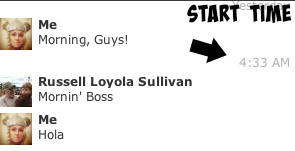
This morning I had three thousand words written before 7:00 a.m. Every morning I hold writing sprints on W.A.N.A. Tribe. All morning long, we go in 40 minute bursts and there is a team for accountability and to drive and push you beyond your comfort zone. I know I am a lazy slacker so I created this to keep me accountable!
Duh.
But any guess how many writers actually show for the sprints?
Usually it’s the same group of ten people out of over 2700…and I am one of them. As a group, I bet we’ve easily written a million words since we started meeting back in November. Every member of the sprinting group finished NaNoWriMo in less than 20 days.
We are still there. Five days a week 9:00 CST. Every day.
The same few people.
A huge reason most writers never make it big is simple. They don’t write.
2—Pros Write No Matter WHAT

Kristen last year with Shingles…and YES I still wrote.
2012-2015 was a living nightmare for me. Our lives had SO much go wrong, I was seriously wondering if voodoo was somehow involved and despite enduring tragedy after tragedy? I still showed up.
Even with Shingles. Hey, I was going to be in pain anyway? Might as well channel it and distract myself.
Life will go wrong and sometimes the only thing we can control is simply showing up. There will never be an ideal time to write. If one comes our way? Fabulous! But don’t count on it. Never underestimate the power of simply showing up.
3—Pros Appreciate We Are Selling a PRODUCT
Writers don’t get a pass. We are a business. We are entrepreneurs bringing a product to market. This is true no matter which publishing path we take. Some writers frown on us indie/self-published folks, but what do y’all think that query is? It’s a business proposal.
An agent is inspecting our product (book) and our brand (platform) and determining potential market value. They are asking, Can we SELL this? And, if so, How many can we sell?
That’s it.
We now have a choice to circumnavigate gatekeepers, but we still are responsible for bringing a solid product to the marketplace. Pros know that.
4—Pros INVEST
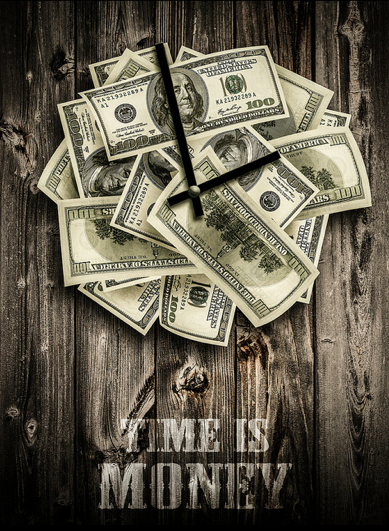
Via Flickr Creative commons, courtesy of Tax Credits.
Since we appreciate we are a product and want to make it the best out there (because we KNOW there is a crap-ton of competition), we invest in ways to make our product the best and to stand out. Since we create the product, we invest time and money in training, conferences, and classes. Once we have a product, we invest in proper editing and cover design.
We invest in things that save us time. You can either spend five years figuring out your brand or hire a pro help you do it in days (yes, I am for hire ;) ).
I suck at organization and detail so I outsource to an assistant. My new assistant Raidon cleaned out over 67K e-mails and organized them for me. That was almost five hours I could do blogging, writing, teaching and consulting.
Trust me. Worth every penny.
5—Pros Study the Successful
We don’t need to reinvent the wheel. Seriously. Most people believe that success is tremendously elusive, but if we study successful people? Most of them did a lot of the same things. I am a HUGE, HUGE fan of Mark Cuban. Every writer needs THIS book; How to Win at the Sport of Business. It’s a short audio book and cost me $5, but WOW.
So much of what he talks about can be applied to writers.
6—Pros Get Paid to Learn
Meaning? They are never “too good” to accept a job. This one really applies to the newbies starting out. In the beginning we have to earn a reputation worth paying for. In the meantime? Take every opportunity you get and knock it outta the park!
When I realized I wanted to go pro with writing? I took every writing job I could get, figuring I was being paid to learn. Whether it was copy for a chiropractor’s web site or specs for software? I did it even though some of those jobs were so boring I wanted to hurl myself in traffic. They didn’t pay much in money (not at first) but I was being paid to learn.
Every one of those jobs paid off.
7—Pros FAIL…A LOT
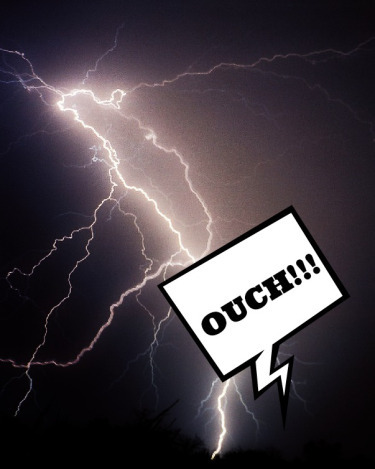
Original image via Melissa Bowersock WANA Commons
We make bad calls, hire the wrong people, write bad blogs and even worse books. By failing a lot we learn what works and what is a waste of time. My failures taught me far more than “success” ever did.
Failure taught me humility and how to have staying power. It’s easy to be in the game when we’re winning, but to keep pressing after you’ve been sucker punched…then run over and then hit by lightning?
That is what separates the wanna-be’s from the pros.
8—Pros are Honest

Original Image via Flickr Creative Commons, courtesy of Mike Spasoff
We are only as strong as our greatest weakness. Pros are honest with where they’re failing. If the books aren’t selling and the feedback is about the writing? We take more classes and write more to put those lessons in action and hone those skills. Hire a rockstar editor.
Again, remember that I suck at organization? Took me a long time to admit that. I bought Daytimers and apps and gadgets and OH DEAR GOD I CANNOT SHOW MY FACE IN CONTAINER STORE…
THE SHAME!
I realized it ain’t gonna happen. Instead of trying to fit this round writer into a square hole? Outsource.
9—Pros Never Stop Training

Image via Flickr Creative Commons, courtesy of Anamorphic Mike.
How successful would a boxer be if he sat on the couch watching inspirational movies about boxing but never actually hauled his tail into a gym? Never worked with a coach to refine technique? Never studied other boxers and their moves? Never sparred to know his weaknesses?
I inhale books. If I am not at my computer working, I am reading…everything. If I am driving or cleaning or cooking? I am also listening to an audiobook. I never watch TV or movies that I am not making notes, busting apart character, plot, dialogue. Where did the story shine? Where did it fail? How would I have improved it?
Pros generally have TWO speeds.
On.
Unconscious.
Even “rest” serves the goals and is active.
10—Pros Understand “Fail to Plan, Plan to Fail”
Most new businesses fail because of a lack of a solid business plan. Same with writers. Which publishing path are you choosing? Why? Do you even know why? What are the advantages and disadvantages of each? Seriously, there is no “right” or “wrong” way to publish, but how we are going to get our product to market is a big deal.
What are your goals? Do you have this mapped out? Do you have contingency plans? Have you done a S.W.O.T. analysis? What is your marketing plan? What is your branding plan? What is your sales plan?
Back to what we started with and the whole kerfluffle of FREE!
How and WHY are we using FREE!?
One of the reasons FREE! has gotten so out of hand is that writers are not using it strategically as part of a larger sales plan.
It’s why I am offering a new class, Making Money with FREE! As a bonus for this class, my friend Jack Patterson who’s so far sold over 150,000 books to come and teach us how to ROCK the newsletter. Sign up before March 7th for $20 off. This is in excess of two hours of training and the recording (as always) comes with purchase.
Just by doing this class, you get several makes of a pro—showing up, investing, training, and learning from people who’ve already done something successfully. I will be learning too. Instead of me writing a terrible newsletter no one wants to open and spending the next three years figuring it out? I am paying Jack to help me teach this class.
I’m no dummy :P .
I am very proud of all of you for even being here and reading this blog. That is the mark of a pro. Instead of watching funny videos? You are here being yelled at inspired.
What are your thoughts? Did you fall for my trick and raise your hand? I hope you didn’t leave a mark. Do you struggle with taking yourself seriously? Do you put everyone and everything ahead of your writing? Does your writing take backseat to everyone else’s wants and needs? Did you change that and see results when you started doing things PROS do?
I really DO love hearing from you!
To prove it and show my love, for the month of MARCH, everyone who leaves a comment I will put your name in a hat. If you comment and link back to my blog on your blog, you get your name in the hat twice. What do you win? The unvarnished truth from yours truly. I will pick a winner once a month and it will be a critique of the first 20 pages of your novel.
For those who need help building a platform and keeping it SIMPLE, pick up a copy of my latest social media/branding book Rise of the Machines—Human Authors in a Digital World on AMAZON, iBooks, or Nook.


February 24, 2016
How to Make EVERY Page of Your Story Interesting
Image by DonkeyHotey/Flickr CC
Today I have another post from that kick@$$ writing teacher I’ve taken hostage *slides food through the slit in wall*. Actually, Alex Limberg is a friend of mine and total rockstar and seriously, check out his free ebook about “44 Key Questions” to test your story; it will help you make your scenes tight and compelling and detect any story problem you might have. Today, Alex is showing us a very interesting recipe to keep every single part of your story interesting. Frees me up to continue working out my plan for global domination.
Take it away, Alex!
****
Uh-oh! It’s showdown time.
In your heart-stopping thriller piece, Tinky the milkman has just found out who poisoned Lady Chatterbee’s canary. Now he is driving to the ash grove for the faceoff in the old mill.
Your scene before and your scene after are sweat-inducing, ear-wringing, eye-popping pieces that keep your audience glued to the page.
But this little scene in between, when Tinky is quietly sitting in his car, motor humming and wheels turning… well, there is just absolutely nothing happening.
It’s a little dull.
Sleep-inducing?
Face it. It would make a dog with rabies put on his pyjamas.
Let’s say you still want it in there. You need a connection piece, you want to slow down the pace a little to ramp it up more effectively later on. Maybe you even want to weave in a bit of backstory, so we better understand where Tinky is coming from.
But how can you do it in a way that doesn’t completely choke off any excitement in your reader?
How do you make a scene that is naturally not very exciting interesting in its own way?
This post will give you a practical roadmap for how to make the in-between sexy. Also, because I know long-winding and unmotivated story parts are often hard to detect for the writer himself, you can here download a free goodie to check your story for superfluous parts and any other imaginable weakness (it uses test questions).
This is how to keep your story fresh and exciting in every scene:
1. If You Can? Trash It
Your first choice should always be to get rid of any in-betweens that don’t advance your plot. To show your protagonist getting out of bed, showering and preparing her breakfast cereals would slow your story down ridiculously, destroy its rhythm and bore the boots off your readers.
There is a storytelling rule that says: “Get into the scene at the latest possible moment and out at the earliest possible moment.” You can observe this rule in meticulous action in screenplays and movies.
Filmmakers in particular can’t afford to bore their audience for even one second. With the ultra-short attention span of today’s YouTube culture, viewers will just cold-bloodedly move on.
Look! Emojis!
However, sometimes you will have your very own reasons to show an additional scene: You may want to show your character in a different light, display her personality or habits or slow down the rhythm on purpose. Maybe you want to give your reader a feeling for passage of time or show social surroundings, working space or landscape. There are a million possible motives.
So should you decide to hang on to your scene, here are a couple of helpful techniques to keep your audience hooked.
2. Introduce Personality: Make It about Character
Instead of worrying how to fill those pages, see them as an awesome opportunity to breathe more life into your characters!
Look at it this way: In most scenes, your plot carries the burden to advance your story.
But now, in your little in-between scene, your character has a chance to fully take the stage and showcase a brand new side of herself. If the story is about her professional life, make that scene about her private life; if the story is about her bright side, make that scene about her dark side – or the other way around.
You might also use the scene to introduce new relationships we don’t know about yet. New relationships can give a deeper glimpse into your character’s personality and show her in a different light.
Each of us human beings is a complete drama on his own. We are also utterly entertaining in our own ways… Use your pages so your reader gets to know your characters better and your entire work will profit!
3. Introduce Action: Make It about Drama
Better yet, when you get several of us together, the drama is exponentiated. So you could involve several characters in your scene and use it for a mini-plot, a play within the play.
Your mini-plot doesn’t have to be connected to the main plot, nor does it have to be about some big and important theme. Depending on your genre, it could be everyday drama and as mundane as a girl forgetting her handbag on the bus.
The overarching plot plays from beginning to end of the entire novel. In turn, your mini-plot could play from beginning to end of the scene, with a similar structure; for example:
Introduction
Problem arises
First attempt at solution
New twist and problem even worsens; Climax
Problem gets solved; Happy ending
If you want the complete ballad of the forgotten handbag, how about this: Girl cheerfully rides on a bus, thinking of happy days (introduction); while she is waiting for her connecting bus, she realizes she has forgotten her handbag (problem arises); she enters the first bus again, only to discover the bag isn’t there anymore (attempt at solution, problem worsens in climax); she asks the driver in desperation and learns that somebody has found the bag and taken it to a lost property office (problem solved); happily she goes to pick it up (happy end).
Of course, you can also let a character play through the whole sequence solely in his mind. For example, let him worry about horrible outcomes of the main plot. At that point, he won’t even have to interact with anybody to create drama; he doesn’t even have to move or to do anything. Just let a worst-case scenario play out in his head.
If you are bored, just make things more difficult for your characters: A nightly walk through the park is a lot more suspenseful if you are not sure if somebody is following you. If nothing else helps, you can always fall back on conflict to spice up your tale.
Make sure your mini-plot fits the kind of story you are telling and doesn’t overwhelm your main plot. A comedy with the mini-plot of a mad axe murderer can be done, but you have to make sure to hit the right note…
4. Introduce Questions: Make It about Suspense
Suspense is always about questions: Who is the murderer? Will Godzilla eat the city? What secret does Martin hide from Sharon?
Your readers will never get bored as long as there are nagging questions on their minds.
Image by Dennis Brekke/Flickr CC
In your in-between scene, you have two choices to raise a question.
Option one: You could spin a question of the overall plot further. For example, letting your character contemplate if Craig can even be the murderer, because he was on vacation the entire time; letting your readers know that Godzilla has just eaten another city block; hinting at that breathtaking secret of Martin’s.
Option two: Your mini-plot could create suspense by raising a question on its own. In the example above, it would be the question: Will the girl ever get her handbag back?
In the end, dealing with in-between sections is about giving your scenes a life of their own. This, of course, is something you should always do in any scene, so it’s excellent practice.
You are a storyteller, and if you want to be a really good one, know that not only the raisin parts of your story are worth telling. Any part of your story should be worth writing well and making it at least a little bit interesting.
And if you do take the effort to polish every part of your story, it will feel continuous and complete and shine on like a crazy diamond. Your story will engage your reader continuously, draw her in deeply and take her on a rollercoaster ride she will never be able to forget.

Alex Limberg is blogging on ‘Ride the Pen’ to help you boost your fiction writing. His blog dissects famous authors (works, not bodies). Check how tight your scenes are and much more with his free ebook “44 Key Questions” to test your story . Shakespeare is jealous. Alex has worked as a copywriter and lived in Vienna, Los Angeles, Madrid and Hamburg.
***
Thanks, Alex!
Kristen here again.
Now let’s hear it from you: What do you usually do with a connection scene? What happens in your story if nothing happens? Do you sometimes let dull story parts slide? Do you proceed to tell people the cookiemonster ate your exciting version? Wouldn’t it be a lot easier if all of our scenes could be as dull as watching water condense?
Remember that comments for guests get double love from me for my contest!
I love hearing from you!
To prove it and show my love, for the month of FEBRUARY, everyone who leaves a comment I will put your name in a hat. If you comment and link back to my blog on your blog, you get your name in the hat twice. What do you win? The unvarnished truth from yours truly. I will pick a winner once a month and it will be a critique of the first 20 pages of your novel, or your query letter, or your synopsis (5 pages or less).


February 19, 2016
Shame on You AOL/Huffington! NO More Literary Booty Calls

Kristen goes FULL VIKING.
Okay, so I just about calm down then see something that fires me up. So yes folks, I put on my war paint. And Huffington Post? You have simply gone too far.
Enough.
Some of you may be asking what has gotten my panties in such a bunch. A friend of mine, Chuck Wendig, who’s a fantastic writer and legendary blogger brought this quote to our attention yesterday in his post Scream It Until Their Ears Bleed—Pay the Fu&%ing Writers. In Chuck’s post, it’s easy to tell what set him off. Check out this quote:

Um…bite me?
THIS Folks, is what happens when we let FREE get out of hand. FREE has side-effects and one of the primary side-effects are hallucinations that the other person likes it and needs it and actually you’re doing them a favor.
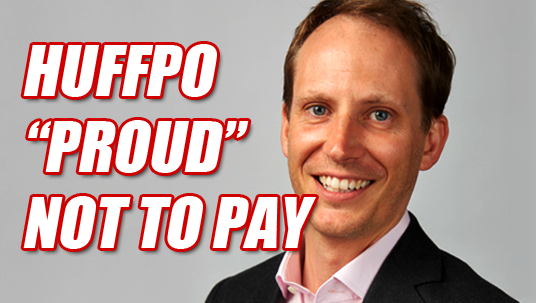
Jackass.
Before we go any further, yesterday I mentioned that I love the work of economist F.A. Hayek and I will say that what Huffington is doing? It IS…*gags* “just.”
They’re doing what they are doing with the permission of those who contribute. Those who contribute feel/believe that it is worth the “partnership” with Huffington and you know what?
That is their right.
Technically, there is no exploitation.
I once was excited to be asked to post for Huffington. I’ll admit, I bit too. At first I felt this gushy pride like I’d been asked to the prom by the captain of the football team, Huff Po. He was soooo cute and other kids would see me on Huff’s arm and be soooo jealous. What that would do for my status!
*hair flip*
But what began as this fantasy that Huff loved me turned sour when he didn’t bring me flowers and only wanted to bend me over the limo for a quickie before he picked up the date he really loved, Advertisina.
Advertisina doesn’t give anything for free. She has standards and so Huff respected her.
Me? I was a literary booty call.
At first I thought my needs would be met. Two posts later? All I wanted to do was cry, eat Ben & Jerry’s and watch some movie with Bette Midler in it.
Advertisina would never be treated this way.
(Read how blogger Chloe Jeffreys was duped by Huffington into being part of a Depends commercial where of course, she was NOT paid).
Authentic Writing
So this assclown Hull believes unpaid workers are more authentic and that quote alone is enough to make me throw up just a little bit in my mouth. Authentic. Can you guys imagine any other business saying this and getting away with it? Any other business so flagrantly exploiting hard working people and getting off scot-free?
Wait. They don’t.

Image via Flickr Creative Commons, courtesy of Paul Stein
AOL/Huffington reportedly brings in $2.3 billion a year and Huffington’s entire business plan rests on profiting off unpaid workers. This means no benefits, no healthcare and no…PAY. Again, if any other business did this? People would lose their ever-loving minds.
But they don’t.
Why?
Well, it’s only writers and they should feel honored to be able to share their work outside of their grandmother’s basement.
We writers are continually treated as if others are doing us a favor and not the other way around. Did I mention that Huffington Post sold for over $300 MILLION?
WRITERS DID THAT.
Shame On You, Arianna Huffington

Original image courtesy of Flickr Creative Commons via C2 Montreal
And maybe what is making me postal is the sheer hubris I’m seeing. Arianna Huffington wrote a book called Thrive and over at Forbes did an interview on why entrepreneurs should embrace the third metric.
All I have to say is…
If Money and Power are two of the metrics and Ms. Huffington calls them LEGS then what exactly is this THIRD METRIC she wants me to embrace and why do I suddenly feel dirty all over again?
Embrace it. Just like that. Sure Baby, I’ll respect you in the morning….
Ms. Huffington is so far removed from reality, she doesn’t even realize she’s a troll.
It (the third metric) matters to entrepreneurs with big ambitions because in this new definition of success, building and looking after our financial capital is not enough. We need to do everything we can to protect and nurture our human capital as well. ~Arianna Huffington
Wow. Don’t you love how rich ladies tell you that money isn’t important. Btw, money is a HUGE factor in how most of us see success.
Hold on, it gets better.
Many of the problems contributing to millennials’ stress — from a weak job market to massive student debt — require political action and economic reform. But at the same time, there are things millennials can do to help strengthen resilience and ingenuity in the face of adversity and also lead to greater performance in the workplace. Meditation, yoga, getting enough sleep, renewing ourselves, and giving back are all ways to make us better at our jobs at the same time that they make us aware that our jobs don’t define who we are. ~Arianna Huffington
Folks, there are few times I am speechless but I need a minute.
I’m back.
Ms. Huffington, I know you’re a mega-millionaire, but I am just going to speak for us little people. What is contributing to our stress are predators like you creating vast systems of wealth that rely on duping unpaid workers into believing you’re actually doing them a favor. Millennials are told to go to college and work really hard and eventually it will pay.
But Huffington doesn’t eventually pay, does it?

The problem is you and your ilk have generated a system where it’s socially acceptable to exploit workers and then demonize that worker if she has the audacity to complain. Ms. Huffington, how DARE you write about me living the life I want, about not settling for less than I am worth?
HOW…DARE…YOU.
You have set the precedent for all kinds of other businesses to find lapses and loopholes to get around compensating contributors. To use technology to get around paying workers.
Workers whose contributions have been valued at some amount or how else would you pay taxes?
Food for thought.
And if they aren’t employees then you don’t need to give them benefits even though they benefitted you to the tune of $300 MILLION. But what do you care? You get to hang out with your pal Oprah who also benefits off unpaid performers who can help her push the same soma about Living the Life You Want.
Sure, and doing porn movies will eventually lead to big roles in Hollywood.
Ms. Huffington, you create a business model that prides itself on not paying contributors and then have the freaking gall to say the answer to worker stress is….YOGA?

Original Image via Wikimedia Commons
But I have to applaud you. You figured out how to monetize Stockholm’s Syndrome.
Btw, Ms. Huffington, embrace your own third metric.
To quote Chuck:
We can pretend that money is somehow a corrosive influence, that it corrupts the journalistic process — oh, wait, but Huffington Post is valued at tens of millions of dollars? Hull even says that they’re profitable. Well, of course they are. It’s easy to be profitable when you don’t pay the people.
Actually, Chuck, I have a correction. HuffPo sold for hundreds of millions.
But again, let’s look at this notion of how NOT paying contributors helps “maintain integrity.” No, I think fellow author KJ Charles said it best:
Let’s be honest: if producers don’t pay people to write, then the people writing are the ones who can afford not to be paid. Which, as with publishing internships, means that the people who can get ahead are the ones with money. The rich parents, the lucrative day job, the well-paid spouse. When producers don’t pay for content, it privileges the voices of the wealthy.
There was a time when writing was a pastime of the wealthy because they were the only ones who could afford to write. Do y’all really want to go back there?
I don’t.
Btw, might I mention that virtually every revolution started with an entitled aristocracy pissing off the working and middle class. We are Digital Citizens, NOT Digital Serfs.

Put On Your War Paint

So here’s the deal, folks. If other writers want to write for Huffington? Have fun storming the castle. Me? My hypocrisy only goes so far.
First, as a writer, I refuse to be a literary booty call. Do I guest post for folks? Sure. But the people I am guest posting for aren’t making hundreds of millions in advertising dollars so they get to pay me with exposure because that is the only capital they have. FREE is on my terms and I am its mistress.
OBEY.
But…
I am not just a writer, I’m a consumer, too. Writers consume a lot of information. We read it, promote it and link to it. Until Huffington mends its ways? It is DEAD to me.
As a consumer, I choose to only support businesses who operate ethically.
I will no longer link EVER to Huffington.
I will not promote ANY article from Huffington.
I will tell everyone who will listen why they need to boycott Huffington.
I will boycott any advertisers linked to them and have no problem shaming the advertisers too because they are profiting off the backs of unpaid workers.
I have uploaded anti-HuffPo memes over on my Author Kristen Lamb page and at Pinterest on my Bite Me HuffPo board for others to see and share.
I am installing Block Site on my web browsers to block ANYTHING tethered to Huffington.
When Huffington issues an apology? I will link to that. When they post about their new plan to add in levels where writers can be compensated? I will link to that too.
And I will link to all PAID Huffington articles.
I had no problems with Huffington using free labor to get started. It was an untested idea. But once HuffPo started raking in the moolah from advertising? I feel there should have been a moral imperative to create some kind of compensation (especially from a woman who went on to write self-help books and claims to have a soul).
The business model should have changed once HuffPo reached profitability.
Sure, the untested newbies could work for exposure, but the pros? The ones blogging regularly who made Ms. Huffington a rich, rich, RICH woman? If she’d actually cared about workers and I dunno…basic human freaking rights….she would have been better served creating a system of compensation instead of cashing out BIG and running off to write Rich White Lady books about how we need yoga instead of money to be successful.
(Btw, she doesn’t accept yoga or exposure for those books. She wants $$$$.)
Writers, we are at a crossroads. We have to start standing up to this crap. If Huffington approaches you to post? I hope you say no. If you’re currently posting for Huffington, I hope you walk away. They have more than enough money to pay for content, but they won’t so long as we keep supplying them. Cut off the free supply and all that’s left is the paid stuff.
But everyone has to make their own choices. Me? I put on my war paint.
PAY THE WRITER
What are your thoughts? Are you tired of aristocracy telling you that you don’t actually need money? I am all for capitalism but this is sociopathy. Do you find it more than a little hypocritical that Ms. Huffington is calling for economic and political reform to aid in the weak job market…a weak market that SHE helped create?
If your landlord doesn’t take exposure dollars, do you think he will accept yoga and meditation as payment?
What do you think of embracing Ms. Huffington’s third metric?
Are you going to put on your war paint? I hope you do! Maybe if enough crazy pissed off painted writers are floating around the Internet people will pay attention.
I really DO love hearing from you!
To prove it and show my love, for the month of FEBRUARY, everyone who leaves a comment I will put your name in a hat. If you comment and link back to my blog on your blog, you get your name in the hat twice. What do you win? The unvarnished truth from yours truly. I will pick a winner once a month and it will be a critique of the first 20 pages of your novel.
For those who need help building a platform and keeping it SIMPLE, pick up a copy of my latest social media/branding book Rise of the Machines—Human Authors in a Digital World on AMAZON, iBooks, or Nook.


February 18, 2016
Making Money in a World Addicted to FREE—What Do Writers DO?
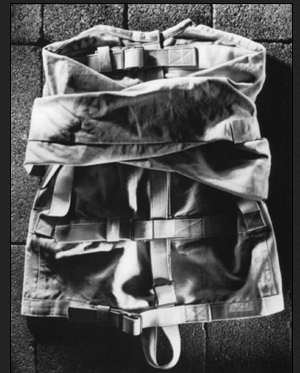
I think we need to renegotiate the terms…
One of the reasons I did such a detailed post about the pop culture and how it’s impacting artists (A Culture Addicted to FREE) is that for us to make any solid plan, we need to gain a good understanding of how things are being run and also grasp current consumer habits.
To fix any problem, we must be aware of what are called operational constraints.
Operational constraints are any real or potential roadblocks in the way of our goals. If you ever do a S.W.O.T. Analysis, which I strongly recommend, it stands for Strengths, Weaknesses, Opportunities and Threats. Any time we do business—which writing IS a business—we need an accurate picture of the terrain so we make wise business decisions and can plan ahead.
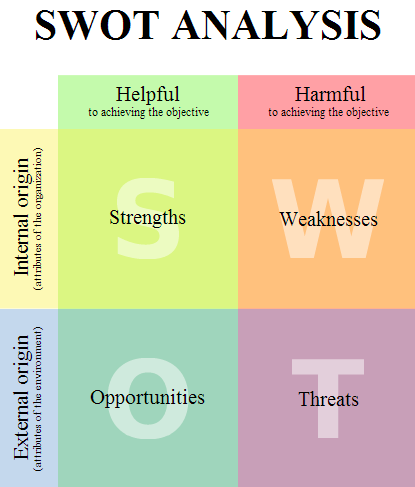
Image via Wikipedia
The entire reason for me blogging about the impact streaming could have on our industry is because that is part of the S.W.O.T. matrix (under Threats). If we only look at what’s going on today, we’re reactive and have fewer options (if any) and we lack maneuverability. If, however, we do the projections and hypothesize about what likely could happen? We’re in a far stronger position and can gain massive advantage.
For instance, in 2007 I took MAJOR heat for saying social media and blogging was going to be a huge game-changer and vital for success.
I could have been wrong, but I planned accordingly and built a brand anyway (just in case).
For all those who felt all they needed was a good book? Who didn’t feel they needed to be on-line? It’s been an uphill battle and they missed out on a LOT of the crazy momentum generated by the initial BIG BANG of Web 2.0 expanding. They were also in a bad spot when literary agents came back with, “Great book. I’d love to rep it but you have no platform. Come back when you get one.”
Yes, Writers ARE Entrepreneurs
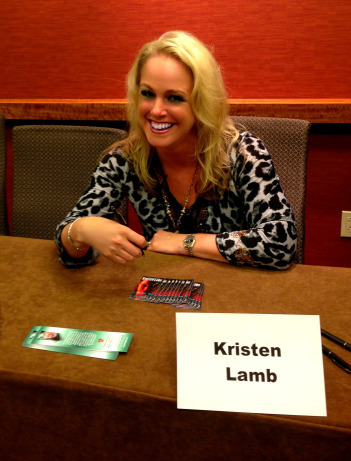
I get that the world often does not see what we do as a business, that for some reason when we tether money to our work then we are no longer doing “art.” Here’s the thing, haters hate for two reasons.
Either a) they benefit from the status quo or b) they believe they are unsuccessful solely because of a system they falsely think is set in stone. Anyone who changes the system can expose the delusion.
For instance, before self-publishing it was easy to believe we were rejected simply because NY only wanted commercial junk (not because we had no frigging clue how to actually write).
Ignore haters. They aren’t going to pay your bills so they don’t get a vote.
Before we talk more about the nitty gritty of the business of what we do, I am going to say this again.
Free is an excellent servant, but a horrible master.
I am all for FREE. I am against the rampant misuse of FREE. FREE will roll over and sit and fetch our slippers. Problem is? We have been letting FREE pee on the carpets and eat the couch cushions. FREE needs obedience training and we are the master. Us whining that FREE keeps embarrassing us by humping the mailman’s leg is not productive.
Writer up and tell FREE to SIT!
Businesses use FREE all the time…to generate business (as in PAID work). We need to do the same. But good businesses don’t just “make stuff FREE.” They get a good idea of the overall topography and then use FREE to maneuver advantage.
If we want to change things and make a good living doing what we do, then we must understand the market to use FREE effectively. Additionally, us looking at streaming and how other artists are being impacted negatively is not whining if we then take that knowledge and do something.
ALL business do this. But apparently when authors act like a business we are accused of whining…which is pissing me off more than a little.
We don’t get what we work for, we get what we negotiate.
My family owns the top sign company in Fort Worth, TX. We do those huge monument signs, lighted signs (think Target, Home Depot, Chili’s, etc.). But we’ve had customers we had to fire. Doing business with them simply was not profitable. Were we whining? No, we were making a business decision.
We decided that the customer’s Pain in the Ass Factor far outweighed their Profit Factor and decided to part ways and find a situation that suited us better. Writers can do the same.
At this juncture, we as artists have two options when it comes to changing our situation in the marketplace. One is what we have been doing here lately.
Power of the Purse

Image via Demi-Brooke Flickr Creative Commons
We educate consumers and use consumer pressure to make the market equitable. That happens all the time. Nike got seriously bad PR for using sweatshops in Asia. The bad press did major damage to their brand and their sales. Feeling pressure from consumers, they had to change their ways unless they wanted to go out of business. Spotify, Pandora, and iTunes have come under scrutiny for exploiting artists.
Fearing consumer wrath? These companies will either change or the power of the purse will exact punishment.
It’s happened before in many other industries.
Food Lion never recovered from a scandal involving bleaching old meat. Taco Bell was hammered (and sued) over their use of Mystery Meat, which gave their brand and bottom line a beating. The chocolate industry was forever altered when consumers found out about the horrific practices and use of child labor. Many major chocolate manufacturers are now almost completely Fair Trade and this was all brought about by consumer pressure.
If shaming and purchasing power works for these other industries? Can work for ours too. But? It might not. So we need to prepare for that.
In the meantime, we are a business so we need to focus more on what we can control.
We Create Something of VALUE

Johnny Cat wants to write his memoir…
Before we can talk at ALL about business I need you to get one thing through your head.
Writers create something of VALUE. We create what people WANT.
I get that folks are addicted to FREE, but they will pay for something they find value in. Our job is to create that value and stop abusing FREE. But why do we struggle with believing what we do has value? A lot of it comes from outside pressure.
One example that I keep seeing used over and over since I started all this with Pay The Writer is the idiot example of a ditch digger.
Just because you decided to dig a ditch doesn’t mean anyone owes you money for a ditch they never asked for.
This is a non sequitur being used to shame us. It is using a false assumption that no one wanted what we created in the first place.
To paraphrase what the Founding Fathers said to King George?
Bite me.
IF no one wanted stories, then why bother with bookstores, movies, television and non-stop streaming entertainment? If no one wanted to buy books then Amazon would have never set up the infrastructure to take business away from the Big Six and make them into the Spiffy Five. If no one wants books, then how the hell are so many selling? The Martian (which was self-published, btw) sold 750,000 copies just in the US and MATT FREAKING DAMON played the protagonist in a blockbuster movie.
I guess it’s a good thing Andy Weir dug that ditch no one asked for.
Basic rule of capitalism? We all create something people don’t want…yet. The thing is our customers simply don’t yet know they want it.
What if Henry Ford never bothered with figuring out how to manufacture automobiles because no one wanted them?
If I had asked people what they wanted, they would have said faster horses.”
~Henry Ford
What if Edison hadn’t bothered with light bulbs? What if the Wright Brothers….
Y’all get the point.
People DO want books. They DO want an escape. They DO want information and entertainment. Trick is to make them want OUR book (that’s another post).
People WANT books, so anyone who uses that ditch digger analogy from now on can just pound sand because the analogy falls apart that writers creating books are anything like this ditch digger creating random holes.
A true parallel is that places like Amazon are acting as connectors/brokers. They know people who LIKE and WANT books and we MAKE books. We do business because every book Amazon moves and delivers for us? We get paid a portion of that.
This is like having a service that connects People in Desperate Need of a Ditch with People with Shovels and Ditch-Digging Skills. There’s an understood contract that if we dig a ditch someone wanted? The broker is paid, but WE ARE TOO.
And, as an owner of a sign company? We get paid really, really well for digging ditches.
Thus, to treat writers as if we are that weird guy who jumps out into traffic and squeegees windshields and then breaks windows if the customer victim doesn’t pay? It’s uncool and inaccurate.
But back to writers…
I don’t think any of us are asking to be paid on books we never sell. But if we do sell? Then whoever is acting as this middleman/connector needs to give us a rate we find to be a sound business decision or…
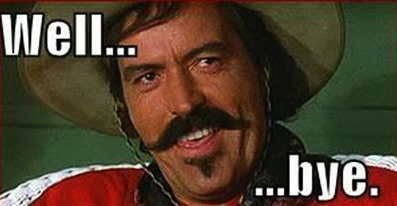
Musicians are doing this. They are saying that getting paid $0.0006 every time a song is played and having to split that $0.0006 per song with everyone who produced the song is BS. They’re saying that if my song is played a million times, the royalty should be more than $17…so Pandora? BUH BYE.
Start With the PRODUCT

BLUE STEAK. But look how CLEVER it is! Really, it’s YUMMY.
Since we are a business, we have to create a product consumers want to buy. In my POV? A lot of authors are too busy being clever in their writing and ignoring substance.
We just want a good steak…no need to make it blue. That’s just weird.
And for all the Wanna Be Authors who are slapping up junk with crappy unedited writing, shoddy formatting and covers that look like they were done by a one-eye drunk? No one wants it. And if they do? I’m a huge fan of Thomas Hayek. If people want to PAY for that? Then it is just.
If people want to pay $300 for a ticket to see Kanye West but won’t go to see a concert pianist even though it’s only $20? I question their taste, but it’s just because consumers have spoken with their dollars.
If people want 50 Shades and not the next great literary genius story? I don’t like it, but people vote with dollars.
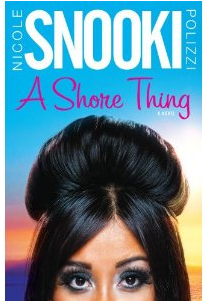
Aaaahhhhhhhhh!
But if the product isn’t selling? Then we’ve failed on some vector and the first one to scrutinize would be the actual product.
Code for try harder.
Write more books and better books. Remember we are not writing for US, but for the reader. We are in the entertainment industry and entertainment implies that more than one person is getting something out of the deal.
I’ve been in workshops where the author was the only one who understood what the hell was going on and when criticized by the audience? They argued. Okay, then be happy selling ONE book because you’ve written for an audience of one.
Invest in good editing, formatting, etc. Yada yada yada.
Create Your Own Economy
The trick of all of this is to create a product consumers want (and ALL businesses have to do this). If we do that and we build a strong enough brand? We don’t NEED iTunes, Amazon, B&N, etc. Thing is, they need us way more than we need them.
Trust me. Amazon does NOT want Andy Weir or Hugh Howey or Grant Cardone to go, You know what? It’s not you, it’s me. Wait, it IS YOU and I think I’ll do my own distribution. Thanks.
The Sword of Technology Cuts Both Ways
The same exact technological innovations that allowed Amazon to plunder the Big Six are the same advances we can use to walk away. We can do our own distribution, our own subscription services, streaming, etc. (there are services popping up to fill that vacuum). We will talk more about these options later, but the point I am making is that if we create a good product and combine it with a solid brand?
We are being a business and in being a business? We can choose how to do business and thereby set the terms of the relationship (or the grounds for terminating that relationship).
In coming posts we will delve more into FREE, how to use it and when to use it. We will talk a lot more about the business side of what we do. Remember we are in the entertainment business. If you don’t have a strong brand, then seriously, get a copy of Rise of the Machines.
I wrote that book because a solid brand is absolutely the most essential component of success beyond the actual product. My methods have launched unknowns from obscurity into record books. So invest in your business and get in the know about your brand.
Okay, what are your thoughts? Are you tired of that ditch-digger analogy too? Do you struggle seeing yourself as having something of VALUE? Is it impacting the way you are running—or not running—your business? Are you overwhelmed? Are there other areas you’d like me to explore and discuss? Do you have additional business advice you’d add for all our benefice?
I really DO love hearing from you!
To prove it and show my love, for the month of FEBRUARY, everyone who leaves a comment I will put your name in a hat. If you comment and link back to my blog on your blog, you get your name in the hat twice. What do you win? The unvarnished truth from yours truly. I will pick a winner once a month and it will be a critique of the first 20 pages of your novel.
For those who need help building a platform and keeping it SIMPLE, pick up a copy of my latest social media/branding book Rise of the Machines—Human Authors in a Digital World on AMAZON, iBooks, or Nook.










